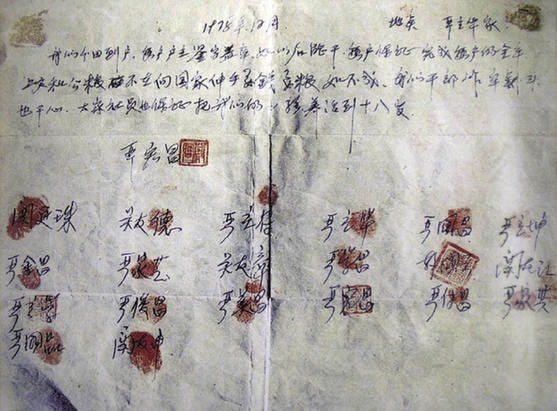|
Xiaogang Village: The Starting Point of Rural Reform
By SHUANG SHUANG
|
 |
|
Farmers of 18 households from Xiaogang signed a secret life-and-death agreement with their thumb prints. |
ON the night of November 24, 1978, farmers of 18 households from Xiaogang, a village in Fengyang County, Anhui Province, signed a secret agreement using their thumb prints. They agreed to divide the land of the local commune into household plots in return for delivering fixed output quotas to the government with the condition of never asking for money or grain from the state. It was also written into the contract that if the cadres went to jail for this proposition, the other villagers would take care of their kids until they were 18. The household contract responsibility system was strictly forbidden at that time.
Xiaogang was notorious locally for its poverty. Every resident received only 50 kg of grain every year, forcing many to roam the countryside begging after each harvest. One reason for this was the system of people's communes, or collective land ownership. The production team decided all matters regarding the land, so farmers had little incentive to work hard and good harvests weren't expected. "All we wanted was to feed our families," one of the signatories recalled. "If we could provide enough food, it was OK even if we ended up beheaded."
In 1979, the village's grain output was increased to 90,000 kg, roughly equal to the aggregation of all yields in the previous 20 years. The grain the village delivered to the government was seven times the fixed quota. Per capita annual income reached RMB 400, 18 times the previous year. The national average income for farmers that year was only RMB 113.6.
The model was soon copied by neighboring villages. The central authorities gave their approval for the trial in 1980. The household contract responsibility system was popularized nationwide four years later, officially raising the curtain on rural reform. Xiaogang was called the "Number One village of China's reform."
In recent years, Xiaogang has undertaken a second experiment: practicing land circulation and pooling plots into a cooperative operation.
On September 30, 2008, Hu Jintao, general secretary of the Communist Party of China, praised the new trial when inspecting the village. Since then, land circulation has been implemented across the country. Farmers are entitled to transfer their rights of land use in return for compensation, making intensive agriculture possible.
| 